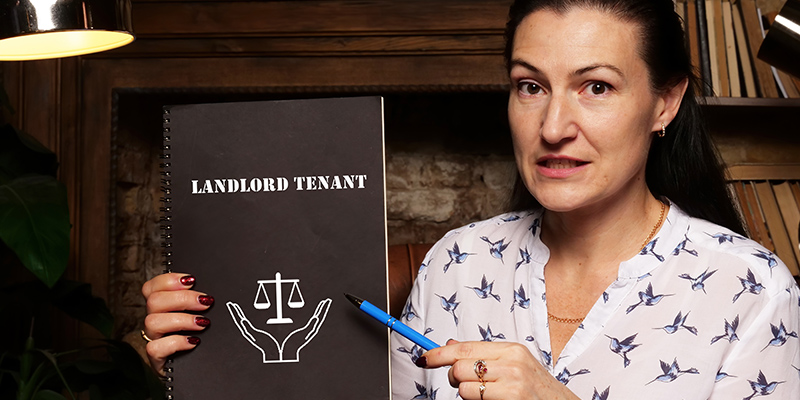A landlord tenant attorney can help with a variety of legal issues related to landlords’ and tenants’ rights. But, how can landlords and tenants know whether it is time to hire professional legal help?
What Is a Landlord Tenant Attorney?
A landlord tenant attorney is an attorney who specializes in dealing with legal issues related to the rights and obligations of landlords and tenants. Because these attorneys are familiar with the various federal and state laws surrounding property management, landlords or tenants would be wise to call on them for help in case of a legal dispute. With their assistance, clients can save thousands of dollars in damages.
Here are the most common types of cases landlord tenant attorneys handle:
- Disputes between landlords and tenants (usually when it comes to the rent, security deposits, and tenants’ rights)
- Personal injury claims
- Writing and reviewing lease agreements and their necessary addendums to ensure protection and compliance with the law
- Evictions
For Tenants: When to Hire a Landlord Tenant Attorney
How do you know it is time to hire an attorney? For tenants, hiring an attorney is often necessary if you experience one or more of the following:
1. Your Landlord Has Failed to Make Needed Repairs
 Landlord-tenant laws require landlords to perform necessary repairs and maintenance to keep a rental space habitable.
Landlord-tenant laws require landlords to perform necessary repairs and maintenance to keep a rental space habitable.
Your lease agreement may also include this important landlord obligation. But, if your landlord is not making these needed repairs, even after you have reminded them, there are a few courses of action you can take.
First, if your state allows it, you can withhold rent until your landlord fixes the problem. You can also choose to repair the issue yourself and deduct the cost of repairs from the rent you pay. Again, this is assuming your state laws allow this recourse.
If you want to take legal action, a lawyer is definitely necessary. But, even if you choose one of the options mentioned above, you will still likely need legal guidance from an experienced attorney. This way, you can ensure your remedies are carried out the right way.
2. You Have Been Injured or Become Sick
If a landlord’s lack of care results in an accident occurring on the rental property, a court may find them liable for injuries and damages. For instance, you might become ill because of mold growth that your landlord failed to address. You might also trip and fall due to a loose or damaged floorboard that your landlord didn’t fix.
Of course, if you decide to sue, you will need to prove your case in order to win. In such a situation, you will need the help of a landlord tenant attorney who handles personal injury cases with a specialization in premises liability.
3. You Are Being Discriminated Against
Discrimination claims are more common than you think, especially in the world of rental management. If you think your landlord is discriminating against you and, thus, has violated the Fair Housing Act, you will need legal counsel to recover damages or put a stop to the act. While the intent to discriminate will cement your case, there have been instances where a court has deemed a landlord liable even though they did not intend to discriminate against anyone.
4. Your Personal Property Has Been Damaged
Your landlord can’t be held liable for all incidents of personal property damage. But, if the damage occurred as a result of their maintenance failure, then you could ask your landlord to reimburse you. For example, your landlord might do a bad job of fixing the plumbing and end up flooding your apartment, destroying your belongings in the process.
If your landlord agrees to reimburse you after a simple talk, then there is no problem. But, if your landlord refuses, you can hire an attorney to help you seek compensation. Keep in mind that your renter’s insurance might cover personal property damage.
5. You Are Being Evicted (With or Without Proper Court Procedures)
Whether or not your landlord goes through proper court procedures, you can hire a lawyer to help you fight an eviction. If you believe, for instance, that your landlord is only evicting you as a way to retaliate against you, a lawyer can help you gather evidence and present your defense.
On the other hand, it is even easier to fight an eviction if your landlord doesn’t go through the proper channels. For example, if your landlord evicts you without notice (as required by state law), your lawyer can argue that the eviction doesn’t count. Most states also prohibit self-help evictions, which is when landlords change the locks on you or forcibly remove your belongings from the premises without a court order.
For Landlords: When to Hire a Landlord Tenant Attorney
Landlords can also benefit from hiring an attorney. If you are a landlord, a lawyer can help you perform the following:
1. Prepare Lease Agreements
Most landlords don’t have the legal expertise to draft effective lease agreements. If you want your lease agreement to cover everything you need and remain in compliance with Fair Housing laws, then you will need a lawyer to create one for you. Alternatively, if you already have a lease agreement in place, a lawyer can review and revise it.
2. Defend Against Personal Injury Claims
As explained previously, tenants can grow ill or hurt themselves on the rental property. Whether or not it is the fault of the landlord, tenants can decide to sue for damages. Landlords, though, will need a proper and solid defense. To do that, you will need the help of an attorney to gather evidence and present your case.
3. Process Evictions
Evictions are typically time-consuming and arduous, as you need to adhere to state and local regulations to avoid liability. A lawyer, though, can help you carry out evictions more efficiently and effectively. A landlord and tenant lawyer already knows what documents to prepare and rules to follow to facilitate a smooth process.
How to Hire a Landlord Tenant Lawyer
If you’ve decided to seek legal counsel, here is a brief guide to hiring a lawyer.
1. Search Locally
There is a good chance your local area has several landlord tenant lawyers, especially if you live in a large city. But, the importance of refining your search to your location is so you can find a lawyer who is actually familiar with your local laws. If you can’t find one through a quick online search, try asking friends and family for recommendations. For landlords, it might also help to ask fellow landlords for referrals.
2. Conduct an Interview
Whether you’re a landlord or tenant, you’re going to want to hire a lawyer with experience. You can get to know your prospects by asking them questions through an interview. Ask them how long they have been practicing landlord-tenant law and whether they have experience in dealing with cases similar to yours.
This is also a good time to find out whether your personalities mesh well. No matter how good a lawyer is, you can’t work with them smoothly if your personalities and values clash.
3. Know Their Fees
Attorneys can use a number of ways to bill their clients, so it is imperative you find this out early on. Will your landlord tenant attorney charge you per hour or according to the service you get? It is also best to understand which services come with a fee and which ones don’t.
On average, a landlord tenant lawyer will charge $225 to $300 per hour. Most of them, though, offer free 30-minute consultations.
Understanding Attorneys’ Fees Clauses in Rental Agreements
Tenants should look at their lease agreement carefully, as some may include an attorneys’ fees clause. This clause essentially means you can get reimbursed for court costs and legal fees if you win a lawsuit against your landlord. With such a clause in your agreement, you will find it easier to look for an attorney who is willing to serve you. This is because they won’t have to worry about getting paid if they win the case.
Keep in mind, though, that attorneys’ fees clauses usually only apply to legal issues related to the lease agreement and its provisions. As such, discrimination and personal injury claims are not covered.
Alternatives for a Smaller Budget
Hiring a landlord tenant attorney is definitely not cheap. If your lease agreement doesn’t have an attorneys’ fees clause or if you simply can’t swing the fee, here are some more affordable alternatives you can use.
 1. Use an Online Tenant Landlord Lawyer Service
1. Use an Online Tenant Landlord Lawyer Service
Some online directories connect you to a lawyer who will then answer any questions you have. If you only need advice and not someone to represent you in court, this is a good option. These services typically charge a small subscription fee, which is nothing compared to the usual price of hiring a lawyer.
2. Lawyers as Coaches
If you don’t need comprehensive legal services, you might find a landlord tenant attorney who will essentially act as your legal coach. They can give you advice and meet with you for an hour only when you need it. For such a service, you can typically negotiate to pay a lower rate than normal.
A Helping Hand
Legal issues arising out of landlord-tenant relationships all the time. From rent disputes to discrimination claims, chances are, you will need a landlord tenant attorney to help and represent you at one point or another.
Property management is a difficult undertaking, though you can find a company that can provide you with legal assistance or connects you with an experienced lawyer to make things easier. Start your search for a property management company today with the help of Rental Choice’s online directory.
RELATED ARTICLES:
- When Is It Right To Evict A Tenant?
- 7 Renters Rights Every Tenant Should Know
- 11 Common Landlord Tenant Issues And Solutions





 Company
Company